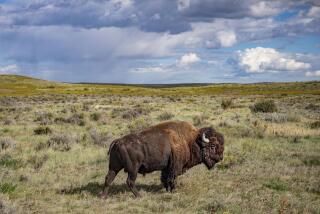Let’s Play Cowboys and Emotions : Lost city gal meets solid country guy. Who needs bridges when you’ve got lust in Big Sky country? : THE HORSE WHISPERER, <i> By Nicholas Evans (Delacorte Press: $23.95; 384 pp.)</i>
- Share via
Move over, Robert Kincaid . . . and make room for Tom Booker, a bona fide cowboy from Montana and the hero of Nicholas Evans’ debut novel, “The Horse Whisperer.” In the unlikely event you don’t know about Robert Kincaid--faux cowboy, ace photographer, ersatz philosopher and star of Robert James Waller’s “The Bridges of Madison County”--this review will hold virtually no interest and you might as well hang it up right here.
But if you’re a fool for a whopper of a love story, then there are some things you should know about Evans’ homage to star-crossed lovers, kismet, horses and, yes, in some ways, the vast popularity of the sort of fiction Waller put into play nearly three years ago. As late 20th-Century fictional heroes, Booker and Kincaid are similar. They are loners, they are imbued with an almost unearthly self-confidence, they are men on the road or on the range.
And even though they carry around their opinions about what’s good in the world and what’s bad in the world the way Moses carried his tablets, they are men of few words, speaking only when there is something monumentally important to say. They attract a certain kind of woman, too, one who fears she has gone slightly off-track and who now is searching for the Right Path.
In “The Horse Whisperer,” that woman is Annie Graves, a 43-year-old beauty from London whose dazzling career in journalism has brought her to the helm of a flashy and famous American magazine (hello, hello: calling Tina Brown). While her success is both phenomenal and highly lucrative, and while she is married to Robert Maclean, a good, smart, sturdy New York lawyer who adores her, all is not well in the soul of Annie Graves.
She has not, for instance, ever fully recovered from the death of her father when she was 10 years old. She often thinks she’s too cerebral and too career-crazed. She has suffered four miscarriages--sorrows not easily forgotten. And then there is the matter of the one child she did bring to term, 13-year-old Grace, a precocious moppet drawn largely to her father as her mother admirably copes with frenetic circumstances at the unnamed glamorous magazine.
When Grace and Pilgrim, her beloved 4-year-old Morgan horse, are trapped in an accident near the family’s country place outside New York, life as Annie and Robert and Grace know it is irrevocably changed. It is a singularly horrific accident: A 40-ton truck suddenly jackknifes on an icy road, killing Grace’s best friend, Judith, and her horse Gulliver. Grief-stricken Grace must have her leg amputated at the knee, and Pilgrim, poor Pilgrim--almost dead but miraculously saved by a brilliant vet--is reduced to an eerie lunacy that borders on the diabolic.
Enter Montana rancher Tom Booker. Lean, lanky, not loquacious. At 45, he’s been divorced and has a 20-year-old son who lives in New York. He’s a guy who appears to be blessedly free of need and steadfast in his convictions. “Ain’t never seen Tom do something he didn’t want,” says one of his hired hands.
Most important, he understands horses. Following in the centuries-old tradition of horse whisperers, i.e., certain men who “could see into the creature’s soul and soothe the wounds they found there,” Tom reluctantly accepts Annie and Grace and Pilgrim on his own turf (the ranch in Montana) in the hope that his magic touch will heal Pilgrim. It should come as no surprise that dear, faithful Robert stays in New York to bring home the bacon and hold down the fort, frequently phoning in his love and support.
So begins the dance. Annie, struggling with a daughter who obliquely blames her mother for the accident, is a woman agonizingly confused and ready for romance. Tom knows his horses and he’s got down his basics. “But you see,” he tells Annie, “where there’s pain, there’s still feeling and where there’s feeling, there’s hope.”
And what feeling there is! Annie and Tom’s passion soars like a rocket in the sky, with Evans creating a super-steamy sex scene that goes on for nearly six pages. “All things were one,” Tom muses, “and like a rider in harmony the best a man could do was recognize the feel and go with it and be as true to it as his soul let him.”
With more than $6 million earned pre-publication (including a movie sale to Robert Redford), “The Horse Whisperer” has, my apologies, a lot riding on it. It’s a big, engrossing book with much to recommend it, and Evans, a British film writer and producer, indeed has a cinematic eye. It’s got lots of suspense to lasso you in: Will Pilgrim ever be the same again? Will Grace forgive her mother and reforge her bonds with Pilgrim? What will become of Annie and Tom? It’s got color: Evans’ descriptions of Big Sky country are richly detailed, and the knowledge he conveys about horses is both fascinating and oddly moving.
It also has some flaws. Often the dialogue is so wooden you yearn to take an ax to it. The cliches that pop up every now and again are ludicrous. “The darkest hour comes before the dawn” and “She felt that if she let herself she could dive into the blue of his eyes” are words you want never to see strung together again.
And the common threads between “Bridges” and this book are somewhat disconcerting: Booker drives a beat-up red Chevy; Kincaid’s was green. The lovers in both novels spend four days and four nights together once their affair is consummated. In both stories, there are love scenes set in a kitchen, candles aglow, good food a-cookin’ on that old stove. Both Booker and Kincaid seem thunderstruck the first time they see their women wearing a dress. And, of course, like Francesca Johnson, Annie Graves is a married woman. A cheerily notable difference, however, is that unlike Robert Kincaid, obnoxiously pumped up to beat the band, Tom Booker, while perhaps a wee too much the dime-store philosopher, is a likable and amiable character.
These caveats aside, “The Horse Whisperer” has what all blockbusters are supposed to have: an unexpected ending that surprises mightily. I think it’s called boffo.
More to Read
Sign up for our Book Club newsletter
Get the latest news, events and more from the Los Angeles Times Book Club, and help us get L.A. reading and talking.
You may occasionally receive promotional content from the Los Angeles Times.








